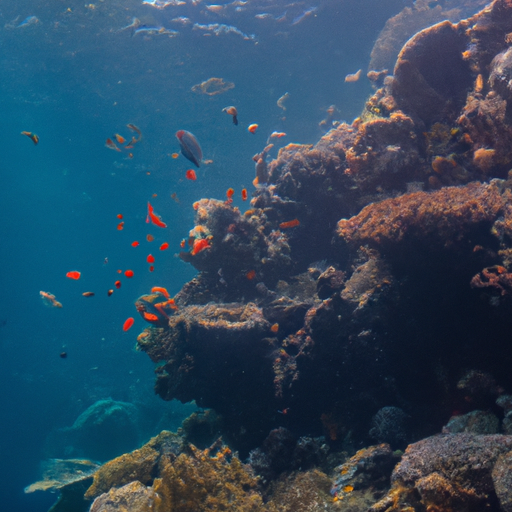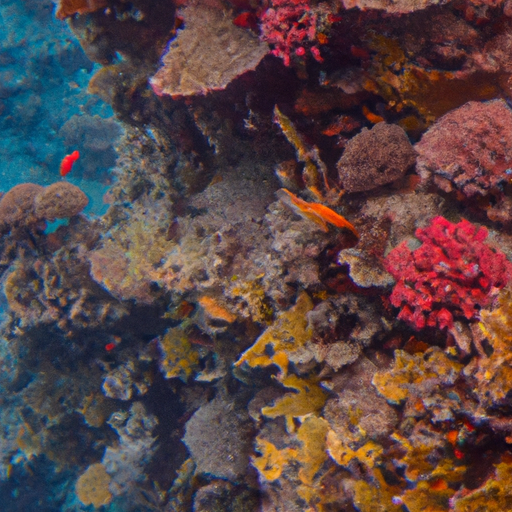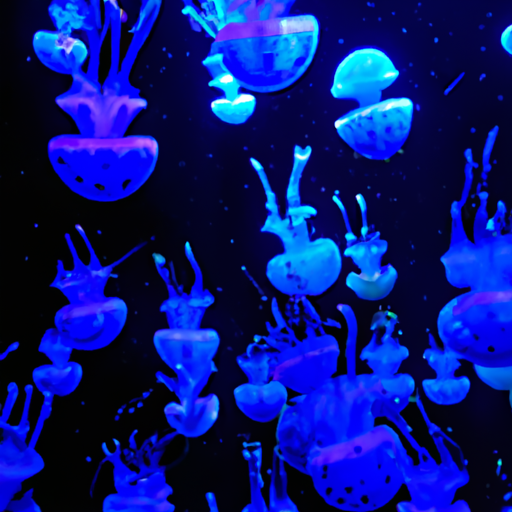
The Urgency of Marine Conservation: Preserving the Oceans for Future Generations
When it comes to the urgency of marine conservation, one key aspect that cannot be overlooked is the importance of protecting marine life for future generations. The oceans are home to a vast array of species, many of which are still not fully understood or even discovered. These creatures play a vital role in maintaining the balance of our planet’s ecosystems, and their conservation is crucial for the well-being of both present and future generations.
Marine life is not only essential for the survival of its own species but also for the overall health of the oceans. For instance, coral reefs are home to countless marine organisms and serve as nurseries for many fish species. Protecting these reefs ensures the continuation of a diverse and thriving marine ecosystem.
Moreover, marine life contributes to the balance of our planet’s climate system. Phytoplankton, for example, play a crucial role in carbon sequestration and oxygen production. These microscopic organisms are responsible for approximately 50% of the world’s oxygen supply. By preserving marine life, we can help mitigate climate change and ensure a future with clean air.
Furthermore, marine life has a direct impact on our economy and social well-being. Coastal communities heavily rely on fishing and tourism, both of which are greatly influenced by the health of marine ecosystems. Preserving marine life means safeguarding not only the livelihoods of millions of people but also the cultural heritage tied to these coastal areas.
Unfortunately, human activities such as overfishing, pollution, and habitat destruction pose a significant threat to marine life. Climate change, with its rising sea temperatures and acidification, further exacerbates the problem. Immediate action is required to counteract these threats and protect marine life for future generations.
Conservation efforts should focus on implementing sustainable fishing practices, reducing plastic pollution, establishing marine protected areas, and promoting responsible tourism. Education and awareness are also key in changing attitudes and behaviors towards marine resources.
In conclusion, the importance of conserving marine life for future generations cannot be overstated. It is not only about preserving the incredible biodiversity and beauty of our oceans but also about ensuring the well-being of our planet and its inhabitants. By taking action now, we can secure a sustainable future where marine life thrives and continues to benefit all life on Earth.
Threats to Marine Life: Understanding the Critical Need for Conservation Efforts
Marine life is facing an unprecedented threat today due to human activities, climate change, and other environmental factors. It is crucial that we understand the critical need for conservation efforts to protect marine life for future generations.
Conservation plays a vital role in safeguarding the diverse ecosystems that marine life depends on. With increasing pollution, overfishing, habitat destruction, and ocean acidification, many species are at risk of extinction. The loss of these species not only disrupts the delicate balance of marine ecosystems but also has profound consequences for human society.
One significant reason for the importance of marine life conservation is the incredible biodiversity found in oceans. From colorful coral reefs to deep-sea trenches, the world’s oceans are teeming with an array of fascinating species. These species provide invaluable ecological services, such as maintaining healthy food chains, regulating climate, and supporting numerous industries like fisheries and tourism.
Conservation efforts aim to mitigate the adverse impacts and protect marine life from further harm. By establishing marine protected areas, implementing sustainable fishing practices, and reducing pollution, we can help restore and preserve marine habitats. These efforts not only prevent species from extinction but also support the recovery and growth of populations in the long run.
It is our moral responsibility to protect marine life for future generations. Our actions today will determine the health and abundance of marine ecosystems for years to come. By engaging in conservation efforts, we can ensure that our children and grandchildren have the opportunity to experience the wondrous beauty and diversity of marine life.
Furthermore, conserving marine life is closely linked to human well-being. Healthy oceans provide us with essential resources such as food, medicine, and even oxygen. Ocean-based industries, such as fisheries and tourism, significantly contribute to economies, providing jobs and livelihoods to millions worldwide. By protecting marine life, we are also safeguarding our own welfare.
Education and awareness are crucial in fostering a sense of responsibility towards marine conservation. By spreading knowledge about the threats facing marine life and the importance of preserving it, we can inspire individuals, communities, and policymakers to take action. Together, we can create a sustainable future where vibrant marine ecosystems thrive, benefiting both nature and human society.
In conclusion, the importance of marine life conservation cannot be overstated. By understanding the critical need for conservation efforts and taking action to protect marine ecosystems, we can ensure the survival and well-being of marine life for future generations. It is a responsibility we must embrace and act upon before it is too late.
Impact of Conservation Initiatives: How Protecting Marine Life Benefits the Environment and Society
The importance of conservation of marine life cannot be overstated. Protecting marine ecosystems is not only crucial for the environment, but also for the well-being of future generations. The world’s oceans are home to a vast array of marine species, many of which are still undiscovered. Preserving these ecosystems ensures the continuation of biodiversity and provides numerous benefits for both the environment and society.
One of the primary reasons for conserving marine life is to maintain the balance of the global ecosystem. Marine ecosystems play a crucial role in regulating climate by absorbing vast amounts of carbon dioxide and producing oxygen through photosynthesis. This process helps mitigate the effects of climate change and contribute to the overall well-being of the planet.
Furthermore, marine life conservation directly impacts society by supporting fisheries and providing a source of food for millions of people around the world. Healthy marine ecosystems are essential for sustaining fish populations and ensuring the livelihoods of communities that rely on fishing as their primary source of income. By protecting marine habitats and implementing sustainable fishing practices, we can ensure that future generations will continue to benefit from the ocean’s resources.
In addition to food security, marine life conservation also contributes to the development of new medicines and scientific research. Many marine organisms possess unique properties that can be used for the development of pharmaceuticals, cosmetics, and other products. By preserving these species, we open doors for scientific breakthroughs that can improve human health and well-being.
Furthermore, marine ecosystems provide recreational and tourism opportunities, attracting visitors from around the world. Coral reefs, for example, are not only breathtakingly beautiful but also support diverse marine life. Protecting these fragile ecosystems ensures their longevity and allows future generations to experience their magnificence.
Finally, conserving marine life is a moral obligation to future generations. By preserving the beauty and diversity of the ocean, we are ensuring that our children and grandchildren will have the opportunity to witness the wonders of marine life. It is our duty to leave a legacy of a healthy and thriving environment for generations to come.
In conclusion, the conservation of marine life is of utmost importance for the environment and society. By protecting marine ecosystems, we can maintain the balance of the global ecosystem, support fisheries, contribute to scientific research, and provide recreational opportunities. Most importantly, we are securing a bright and sustainable future for generations to come.
Building a Sustainable Future: Strategies for Effective Marine Conservation
Conservation is crucial for maintaining the health and well-being of our planet’s ecosystems, particularly when it comes to protecting marine life. With the increasing threats to our oceans, including overfishing, pollution, and climate change, it is more important than ever to implement effective strategies for marine conservation.
One of the key reasons for prioritizing marine conservation is to protect the incredible biodiversity found in our oceans. Marine ecosystems are home to a vast array of species, many of which are still undiscovered. These species play a vital role in maintaining the delicate balance of marine ecosystems and contribute to the overall health of our planet. By conserving marine life, we ensure that future generations can continue to benefit from the wonders of the sea.
Furthermore, marine life provides numerous benefits to human society. Oceans are a significant source of food, with millions of people relying on fish as their primary protein source. By protecting marine life, we ensure the sustainability of these vital resources and safeguard the livelihoods of coastal communities worldwide.
Conservation efforts also focus on protecting the habitats and ecosystems that marine life depends on. Coral reefs, seagrass meadows, and mangroves provide essential breeding grounds, shelter, and nurseries for many marine species. These habitats are not only beautiful and diverse but also serve as natural buffers against storms and erosion, protecting coastal communities from natural disasters.
Implementing effective strategies for marine conservation requires a combination of local, national, and international efforts. This includes establishing marine protected areas (MPAs) to safeguard critical habitats, enforcing regulations to prevent overfishing and illegal fishing practices, reducing pollution and plastic waste, and addressing the impacts of climate change on marine ecosystems.
Education and awareness play a crucial role in marine conservation, as they help to foster a sense of responsibility and empower individuals to make sustainable choices. By promoting public understanding of the importance of marine conservation, we can inspire positive changes in attitudes and behaviors towards the oceans.
In conclusion, the conservation of marine life is of paramount importance for the present and future generations. Through effective strategies and collaborative efforts, we can ensure the sustainability and health of our oceans, protecting marine life and the invaluable benefits it provides to both nature and human society.
Keywords: marine conservation, marine life, biodiversity, habitats, marine protected areas, overfishing, pollution, climate change, sustainability


